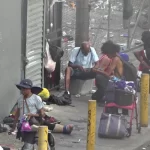The city of Philadelphia recently released a 100-day Public Safety Plan aiming to crack down on open-air drug use and sales in the Kensington neighborhood. The plan calls for increased police presence and arrests for drugs, sex work, and other “criminal acts.” Advocates express deep concerns about the impacts on vulnerable homeless individuals struggling with substance use disorders. In this article we talk about: Philadelphia City Plan Raises Concerns, Homeless Individuals Facing Tough Choices Between Jail and Treatment
Kensington’s Opioid Crisis and the City’s 100-Day Plan
Kensington has become an epicenter of the opioid crisis, with rampant injection drug use happening openly on the streets. The city’s plan aims to “reclaim” the neighborhood through police action over a 100-day initiative implemented in five phases. After initial warnings, a heavy police presence will “secure” the area, before eventually pulling back and reallocating resources elsewhere.
This essentially amounts to a planned eviction and displacement of the neighborhood’s entrenched homeless population. With a sweep planned for May 8th, providers are scrambling to prepare for a sudden influx of new participants needing services. Advocates have taken to the streets, informing individuals of their rights and details of the impending police action.
The Crisis in Philadelphia Jails
“The Philadelphia jails are currently not functional; they are in crisis,” said Leigh Owens of the Pennsylvania Prison Society. “While incarceration is never an effective response to drug use, today in Philadelphia, without a functioning jail, it would be catastrophic.”
The city jail system has been under federal oversight since April due to its poor unsafe conditions. A settlement mandated reducing medical backlogs and reestablishing mental health programming. However, conditions have continued deteriorating, with 14 deaths, including two suicides, one homicide, and two overdoses. Civil rights group have now filed contempt motions over “systemic violations of constitutional rights.”
Concerns Over Incarcerating Drug Users in Philadelphia
Advocates warn that incarcerating vulnerable drug users could trigger severe withdrawals and medical crises in the dysfunctional jails. Proper medications and treatment protocols are lacking. The Eighth Amendment prohibits cruel and unusual punishments, including forcing prisoners to undergo uncontrolled withdrawals. Jail overdoses often go underreported but still claim lives regularly when people self-medicate to treat their own withdrawal suffering.
Even if individuals agree to treatment, adequate supportive housing and follow-up care remain huge question marks. Mayor Cherelle Parker has promoted forthcoming triage centers similar to existing police-assisted diversion programs but refuses to provide specifics.
“Before attempting mass incarcerations, immediate action should ensure detained individuals’ health and safety,” said Kevin Moore, an opioid use disorder specialist. “Improving social conditions – housing, food, jobs, safety – is what’s needed to help Kensington thrive.”
Challenges Facing Hospitals and Treatment Centers in Assisting Vulnerable Populations
Hospitals and treatment centers outside jails also struggle assisting vulnerable populations. For example, a patient recently died while detoxing at an inpatient rehab facility in nearby Montgomery County. Another died in a West Philadelphia behavioral health unit last November after the hospital had closed its drug treatment center.
Johnson v. Grants Pass:
A pending Supreme Court case, Johnson v. Grants Pass, will determine whether cities can prohibit sleeping in public without providing alternatives. A summer ruling could mandate cities shelter or house homeless individuals instead of fining, arresting, or jailing them when shelter is unavailable.
Philadelphia Mayor Parker has requested $100 million from City Council to fund the Kensington crackdown initiative. While early bombastic language has softened, police still intend arresting people for drug use and sex work. Officials now emphasize treatment over arrests but have not detailed plans to expand capacity.
Advocates warn the lack of thoughtful planning could still disastrously overload the city’s insufficient health and social services infrastructure. Without extensive supportive housing and care, the most vulnerable individuals could end up back on the streets or cycling through jails and hospitals indefinitely.
Key Concerns Over Philadelphia’s Plan to Address Kensington Homelessness and Addiction:
- Police initiative over 100 days aims to “reclaim” neighborhood via arrests and evictions
- Providers warn sudden displacement will overwhelm capacity to assist vulnerable individuals
- Jails are understaffed, unsafe and cannot handle influx of people with complex medical needs
- Withdrawals behind bars could endanger lives without proper medications and treatment
- Hospitals/rehabs also struggle handling homeless patients with substance use disorders
- Supreme Court case may require cities to house individuals if shelters are unavailable
- While language is softening, police still intend arrests for drugs and sex work
- Lack of supportive housing raises risk of endlessly cycling vulnerable people through ineffective systems
- $100 million investment to expand capacity remains an open question
The Kensington neighborhood clearly suffers from entrenched issues of poverty, homelessness, addiction and despair. However, advocates argue healing and progress cannot be achieved through aggressive police action and incarceration. Improving social determinants of health and expanding capacity for supportive care will be essential to creating lasting positive change. Otherwise, Philadelphia risks further destabilizing vulnerable individuals and communities instead of empowering them. I sincerely hope you find this “Philadelphia City Plan Raises Concerns, Homeless Individuals Facing Tough Choices Between Jail and Treatment” article helpful.

Skylar Lacey, a Travel and Tourism Management graduate from Temple University, offers 5 years of experience in travel writing and airport logistics at PhiladelphiaAirport.net. Her expertise helps travelers make the most of their journeys through Philadelphia International Airport. Connect with her on Instagram for more travel tips and insights.






